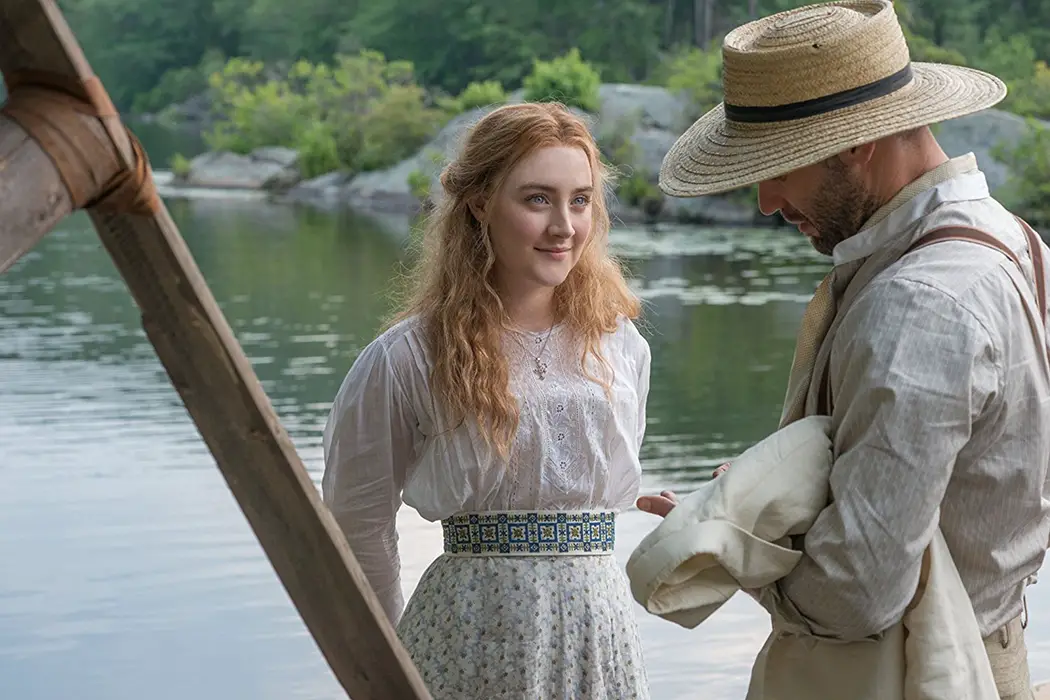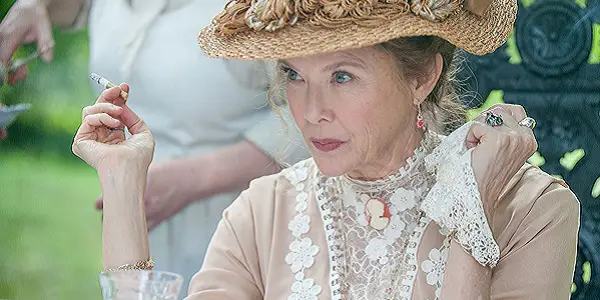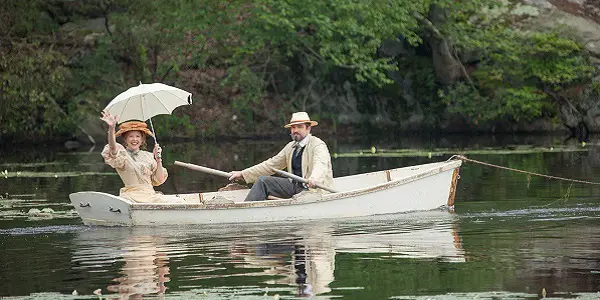THE SEAGULL: A Picturesque Drama Anchored By Three Great Women

Lee Jutton has directed short films starring a killer toaster,…
Anton Chekhov’s name is a byword for prestige drama; his classic plays are almost continuously restaged and readapted so that his famous characters can be tackled over and over by actors hungry to prove their worth by wrestling with his emotionally resonant dialogue. Now, one of his best-known works is back on the big screen.
Adapted by Tony Award-winning playwright Stephen Karam (The Humans) and directed by Tony Award-winning director Michael Mayer (Spring Awakening), The Seagull invites us into the beautiful, privileged world of the Russian bourgeoisie and exposes the ugliness that lies buried beneath the sun-dappled trees. It’s a visually stunning, delightfully acted drama that highlights the inherent weaknesses in human nature, especially when it comes to the things we desire most.
Anton Chekhov’s Russian Vacation
The film begins when famous actress Irina Arkadina (Annette Bening) arrives at the lovely lakeside estate where her brother, retired civil servant Pjotr Nikolayevich Sorin (Brian Dennehy), and her son, struggling playwright and wannabe artistic revolutionary Konstantin (Billy Howle), live. The weekend retreat ends up being less than peaceful, as Irina and Konstantin constantly bicker over his uncertain future as a writer – especially after Irina ridicules an avant-garde play written by Konstantin and performed by a pretty young girl on the neighboring estate, Nina (Saoirse Ronan).
Konstantin is also riddled with jealousy of his mother’s lover, the renowned novelist Boris Trigorin (Corey Stoll), who has joined Irina on the trip. Konstantin’s jealousy is only compounded as he realizes how much Nina, who dreams of taking the stage as a famous actress, is drawn to this older, much more successful writer.

But Irina, Boris, Konstantin, and Nina aren’t the only complicated characters populating the beautiful estate. Masha (Elisabeth Moss), the daughter of the estate’s steward, deals with her unrequited love for Konstantin by wearing nothing but black (in mourning for her life, so she says) and tossing back vodka with her morning meal. Meanwhile, a local schoolteacher pines for Masha even as she rudely dismisses him over and over again in favor of the clueless Konstantin.
On top of that, Masha’s mother, Polina (Mare Winningham), is having a secret love affair with a local doctor (Jon Tenney). Keeping track of all of the crisscrossing relationships on the estate is enough to make anyone’s head spin without adding an additional layer of creative jealousy on top of the romantic drama. And all of this unfolds in just over 90 minutes of screen time! (Are you exhausted yet?)
The Art of Adaptation
Thanks to the three fierce women at its center – Bening as Irina, Moss as Masha, and Ronan as Nina – The Seagull is enjoyable even when it veers into excessive melodrama. Chekhov’s words are so intense that they feel meant for the stage, where outsized acting is more natural; fortunately, in this adaptation, the majority of the actors adjust their performances accordingly and underplay the drama for the screen.
Moss, in particular, shines, highlighting the humor to be found in Masha’s self-imposed mourning for the love she will never have. In Moss’s capable hands, Masha is every “forever alone” meme come to life clad in frumpy black – but she’s also so much more than a tear-streaked, vodka-soaked figure of ridicule. When Masha debates marrying the teacher that she does not love, just to avoid a future alone, one cannot help but empathize with the impossibility of her situation – especially since Konstantin, with his pretentious pronouncements about art and tendency to throw tantrums when he doesn’t get his way, is utterly insufferable.

If Konstantin were displaced from early twentieth century Russia to the present day, he’d be a trust fund kid in Bushwick with a useless MFA, no student loans, and parents he resents for being too bourgeois even as they pay the rent on his apartment. His annoying nature is the fault of both Chekhov and Howle, who is the weak link in the otherwise stellar ensemble of actors. Despite his infantile behavior, one should have some sympathy for Konstantin and the way his mother has dismissed him for his entire life.
But when Konstantin is played by Howle and Irina by the wonderfully regal Annette Bening, it’s easy to take the mother’s side, even if that mother is so selfish that she can’t begin to comprehend the consequences of her actions on others. An aging actress deluded about the youthfulness of her appearance, who pretends to not value the spotlight until the moment it is about to be given to someone else, Irina is a tone-deaf comic marvel that Bening feels born to play. I have never seen another production of The Seagull, but having seen this one, I cannot imagine another actress in the role.
Of course, one cannot overlook Lady Bird herself, the divine Saoirse Ronan, and her wonderful, heartbreakingly naive performance as Nina. With every film of hers I see, I become even more convinced that Ronan is the defining actress of her generation; she manages to straddle the line between youthful innocence and preternatural wisdom in every role she takes on, including this one. Watching her, as Nina, succumb to the lure of Boris’s fame and artistic glory is all too easy to understand, especially when Boris has the easy, natural charisma of Corey Stoll. Boris is essentially a manipulator and a predator, but Stoll turns on the charm and manages to trick both Nina and the audience into thinking that his intentions might be pure after all.

The Seagull is an actor-driven film from the first frame to the end, but respects must also be paid to the costume designer, Ann Roth (an Oscar winner for her work on The English Patient). Her decadently detailed period creations make one long to throw on one of Nina’s frothy white dresses – a more obvious signpost for her innocence there never was – and float through the Russian countryside like a butterfly with slightly bruised wings. The film is also beautifully shot, and primarily outdoors, by Matthew J. Lloyd, a regular player in the Marvel Cinematic Universe. Even as these people break each other’s hearts and tear each other down, one still longs to enter their beautiful, sun-drenched world thanks to Lloyd’s work.
Conclusion: The Seagull
The Seagull is a gorgeous adaptation of one of the world’s most beloved plays. The characters are not always likable, and the things they do to each other are often painful. But the words they have to say to each other and to the audience – about love, art, fame, and other human desires – remain powerful even in the age of Internet celebrity.
What do you think? Does The Seagull sound too over-the-top to be truly enjoyable? Share your thoughts in the comments below.
The Seagull is released in theaters in the U.S. on May 11, 2018. You can find more international release dates here.
Does content like this matter to you?
Become a Member and support film journalism. Unlock access to all of Film Inquiry`s great articles. Join a community of like-minded readers who are passionate about cinema - get access to our private members Network, give back to independent filmmakers, and more.
Lee Jutton has directed short films starring a killer toaster, a killer Christmas tree, and a not-killer leopard. Her writing has appeared in publications such as Film School Rejects, Bitch: A Feminist Response to Pop Culture, Bitch Flicks, TV Fanatic, and Just Press Play. When not watching, making, or writing about films, she can usually be found on Twitter obsessing over soccer, BTS, and her cat.













